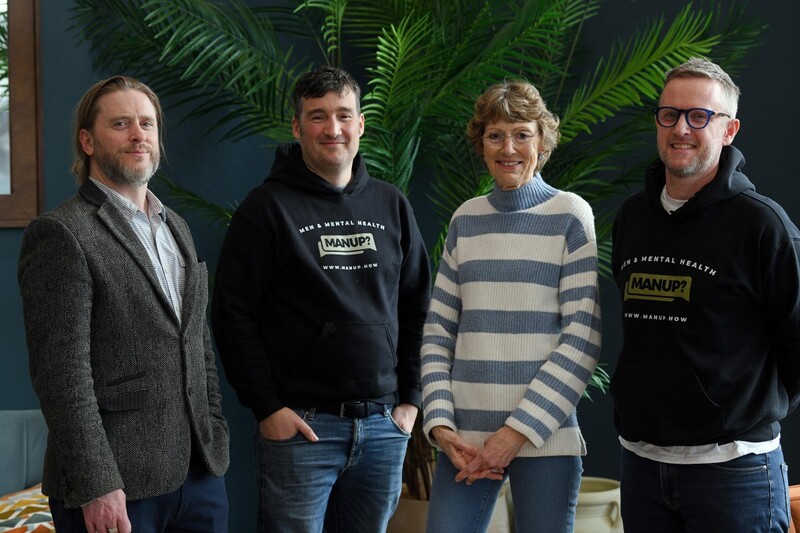Intelligence, community and recognition for pay and reward professionals.
Uncomplicating mental health at work
 Amy Assad
Amy AssadA candid interview with the CEO of charity MANUP? on mental health in the workplace

MANUP? was never intended to be a charity; it started as a simple idea to gather 1,000 men in a field to raise awareness about the struggles men face in expressing their emotions. The event took an unexpected turn however when a man attempted suicide nearby, serving as a stark reminder of the urgency of the issue it was created to address.
What began as a one-off event quickly evolved into a support system, with weekly videos featuring men sharing their experiences. As requests for help poured in, founder Dan Somers recognised the need for a regulated platform, leading to the establishment of MANUP? as a charity.
The idea for MANUP? – the name itself challenges the use of the term – came about in March 2019, when Somers learned of the death of a friend on the DJ circuit, Prodigy singer Keith Flint. He was struck by the realisation of how deeply mental health issues were impacting the lives of those around him. Also witnessing first-hand the challenges men face in discussing their mental health at work, Somers recalled an experience early in his career when he was nearly fired for failing to disclose a previous prescription for antidepressants.
While large corporations often implement mental health initiatives as a tick-box exercise, MANUP? advocates for simple, cost-effective solutions that will have meaningful impact.
In an interview with Reward Strategy, MANUP’s CEO & Founder Dan Somers and Financial Trustee Ian Dempsey shed light on the profound impact their organisation has had and the persistent barriers they face in promoting open conversations about mental health, particularly in corporate environments.
Can you tell us how MANUP? got started?
DS: It all started when Keith Flint died in March 2019 – it hit me quite hard. I knew Keith through the rave and club scene, even the motorbike racing scene, and got to know him personally. I remember sitting in the office that day I got the message and I said, “another one”. The person I was sat with said, “what do you mean another?” I counted – back then, about 20 or 21 other people I knew who had died from mental health issues or suicide. I just put it down to being raised in care, and the lifestyle of being in the rave scene and clubs. Back then, I had attempted it about two or three times myself. But then I began to look at the statistics.
The government was putting out statistics saying suicide rates were going down, but every weekend I was running a soup kitchen with 60 volunteers, and we were feeding 60 to 200 men who were struggling with mental health, drug, or housing problems. They weren’t part of the official statistics because they weren’t instantly taking their lives.
I decided to try and do something. I planned a one-off event to get 1,000 men in a field with their hands up for a photo to say, "It’s okay not to be okay". But on that day, there were reports of a man attempting suicide off the nearby Orwell bridge.
Seeing that, really drove home why I needed to do more than just a one-time thing. Then COVID happened. Short videos on mental health progressed into one-on-one counselling sessions when so many people started reaching out for help. I started to do welfare checks – I’d ring the police saying, “I don’t know what to do”. I realised I needed to make it an official, regulated charity to properly support people. That’s how MANUP? was born.
What are some mental health challenges you’ve witnessed in the workplace?
DS: So that was the hidden agenda of the ROI [ MANUP?’s mental health workshop] – we’re very much about trying to make a change. It’s fine telling men to talk and go to the doctors, but many we talk to have, and 91% of men who’ve sadly taken their own lives were in the frontline services. Where along that journey has something broken?
One example that really sticks with me in the business world is from years ago when I worked at a car insurance company and was one of the top salespeople, literally untouchable, and in the evening I was going out DJ’ing at the Ministry of Sound... and no-one noticed how depressed I was.
I’d previously been prescribed antidepressants, which I didn’t disclose when I was hired. They somehow found out and pulled me into HR accusing me of lying on my medical records. I was terrified of losing my job and income, so in that moment of overwhelming shame, I lied and said the medication was actually for my brother who had mental health issues. I made him send an email pretending to be me to corroborate the story. That fear and stigma really stuck with me.
I see the same pattern a lot – people get ignored or just told to speak to an unqualified "mental health first aider" at work. That common response of "Go talk to so-and-so who had a half-day training" isn’t good enough.
The other issue I see is it’s down to money. We explain [to some of these large organisations] that smaller companies we know have spent £200 hiring a burger van where everyone can go outside and have a natter and their staff turnover is next to zero now, because everyone is just happier.
We decided we should go after business leaders and uncomplicate that discussion around mental health.
How can businesses better support employees’ mental health?
ID: Many large corporations still view mental health challenges as something to be addressed top-down through tick-box exercises like offering counselling. This "you’ll be okay, just talk to so-and-so" is nowhere near enough support. Employees are often caught in that trap, simply existing in that workspace without receiving the level of care they need.
This approach doesn’t work because it fails to address the underlying company culture. My background is in big corporates. In certain industries, certain demographics, mental health struggles are still seen as a taboo weakness, but these are the ones most at risk.
People are hesitant to open up for fear of being judged or viewed as incapable. Smaller companies implementing robust mental health policies see returns of 5 times their investment, so for every pound spent you’d get a return of 5 pounds -- this is backed up by hours of research -- while big corporations are able to afford such programs but often don’t prioritise them.
Have you seen an successes with that resistant mindset?
ID: By the time we start working with these companies, they’ve already started to take those initial steps. But the challenge we have is we’re a very small team. We’re mostly volunteers. We’ve all got day jobs, families etc. There’s only so much we can do as a charity, but we really punch above our weight in terms of what we do and what we deliver.
I think it’s fair to say that we’re tired of the traditional approaches – there’s some great people out there, some great charities out there. Our view is well we all want the same thing, why can’t we just work together?
It’s been very challenging to capitalise collaborations with other charities and sometimes businesses. We’ve decided to take it on ourselves to do some really forward thinking, interesting work. Some of that is working with the NHS, doctors, sponsoring PHDs. We recently started offering free training with a psychotherapist – as a small charity of five.
Why aren’t the big boys doing that?
What are some other small but impactful methods companies can incorporate?
DS: The biggest hurdle I see is business leaders legitimately wanting to do more for mental health but just not knowing where to start. It’s as if, if they don’t mention these things in their policies they can disassociate from it. Mental health first aider training is commonly advised, but having just 2-3 first aiders isn’t enough. Consider doing a half-day mental health awareness course for the whole team -- it’s £500 -- instead of the expensive 2-day first aider certification.
Implement simple, lower-cost initiatives that create a supportive culture. Something like having a burger van come for a day where people can step away from their desks and connect over food. Or allowing flexibility for people to work from home or the office as fits their needs best. [One company] just left their office open and said come in if you like. Taking the pressure off working from home -- it costs nothing.
The theme of this is, just uncomplicate it. You don’t need to be qualified to be a friend.
ID: It’s the old conversation of how are you?... But how are you really? Those small check-ins over coffee or water cooler chats can also make a big difference for people feeling unheard or lacking purpose. The goal is to intervene early, 5-10 steps before someone reaches a crisis point standing on a bridge.
Look for slight behavioural changes and create an environment where people feel comfortable opening up to events, friends, partners - not just when they’ve already hit rock bottom. Mental health needs to be an ongoing conversation, not something only addressed at the crisis stage.
What advice do you have for leaders trying to destigmatise talking about or prioritising mental health?
ID: Talk to your team. Talk to your team and find out what they want. Try different initiatives because there’s no one-size-fits-all solution. You might have someone who’s on the outskirts who doesn’t get involved -- but there might be something really simple you can do to help them.
I’m really on the fence for surveys I think that can be manipulated if the questions are asked in a certain manner [to reflect the business’s culture or rhetoric]. Face to face conversations are powerful. But again, how are we going to open up this conversation? Anonymous conversations are very, very powerful. I’ve done a couple of webinars where the screens are blacked out and nicknames are used, and the conversations that come out of that are incredible.
What are your hopes for MANUP?’s upcoming ROI Mental Health Workshop?
DS: The main goal is getting business leaders and directors to prioritise mental health by showing them how much it benefits their bottom line. It’s a platform to say, they’re focusing on this and it doesn’t cost them a lot of money -- So, why aren’t you, again?
ID: The powerful thing is there are other businesses on the stage and in the audience who’ve implemented strategies and sharing what’s worked for them. It creates that sense of community and for people to take that away and say, "maybe we need to change".
MANUP?s ‘ROI on mental health’ event will be hosted by BBC Radio Suffolk’s Wayne Bavin and takes place on Friday 7th June 2024, at King Street Cinema, Corn Exchange in Ipswich. For more details on the event, visit www.manup.how/events/roi-2024.
